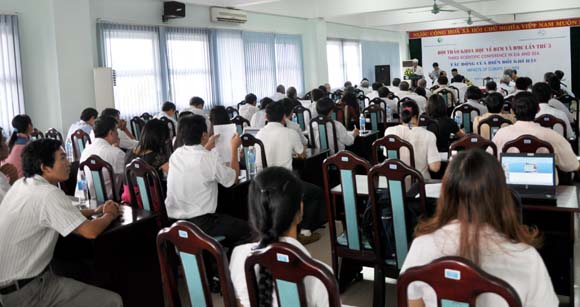Mr. MYUNGJIN KIM - President of KSEIA
Good morning, honorable deputy minister of MONRE, Prof. Bui Cach Tuyen, and members of the Vietnam Association for Environmental Impact Assessment (VAFEIA) and the Korean Society of Environmental Impact Assessment (KSEIA). I am honored and delighted to greet you in opening the 3rd Vietnam-Korea Scientific Conference on Environmental Impact Assessment (EIA) and Strategic Environmental Assessment (SEA) here at prestigious Hue University in historic Hue city, the imperial capital of the Nguyen Dynasty renowned for its monuments and architecture.
Today’s theme is “Impacts of Climate Change.” I learn that “Hue” in Chinese characters means to change or become. People in this place have indeed seen many changes in past decades. The impacts of global warming are now slowly coming into view, punctuated by such events as the recent unprecedented flooding in Seoul and underlined by gradual trends such as extended growing seasons and the appearance of exotic species. Nevertheless, we have barely perceived much less prepared for the consequences that are to come. In extreme cases, the very existence of global warming is denied.
Before coming here, I ecotrekked the beautiful Annapurna region of the Himalayas. I viewed receding glaciers and thinning ice fields at the higher elevations. It is worth recalling that annual Himalayan snowfall is the renewable source of water for major rivers of Central, East, South, and Southeast Asia and the growing populations that depend on them. Interruption or depletion of this vital source of water supply would cause disastrous consequences.

Impact assessment can serve to anticipate and mitigate such impacts, and to devise alternatives for sustainable adaptation to climate change. Practitioners are exploring EIA and SEA procedures and methods to reduce the vulnerability of our countries and to increase their resilience.
Since the first Hanoi meeting on December 7, 2007, we have convened biannually to discuss such approaches for promoting the two countries’ sustainable development. We can apply the lessons learned from that experience to the topic at hand, for example, operational methodologies for the transition to sustainable development.
Next year is the twentieth anniversary of the United Nations Conference on Environment and Development (UNCED), the “Earth Summit” held in Rio de Janeiro, Brazil. Its signal achievement was to confirm the United Nation’s commitment to “sustainable development” as its core value and organizing principle. Twenty years later that concept and commitment of sustainable development have become general in governments and peoples around the world. The 2012 United Nations Conference on Sustainable Development – “Rio+20” – will have as its themes the transition to “a green economy within the context of sustainable development and poverty eradication”, and “the institutional framework for sustainable development.”
Our discussions at this meeting can contribute not only to our two countries but also to Rio+20 and global society in the quest for equitable and sustainable development.
Finally, I would like to thank Dr. Le Trinh, President of VAFEIA and all leaders of VAFEIA, Dr. Le Dang Hoan, and all you for participation in this conference and your contributions to securing future sustainable environments and societies.
Thank you very much. Let the discussions begin.